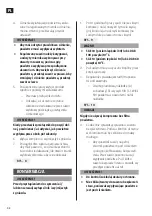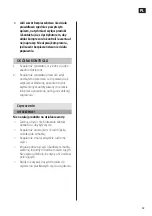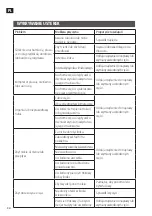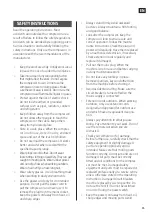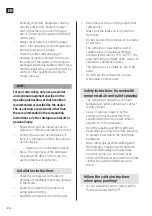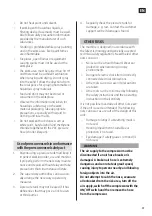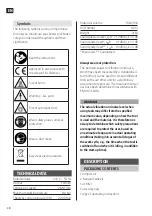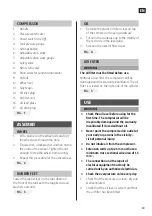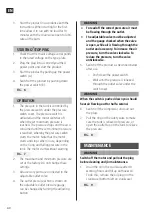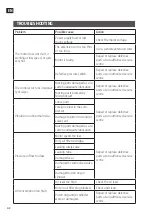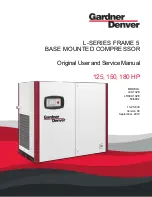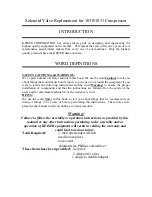
EN
35
• Always stand firmly. Avoid awkward
postures. Always maintain a firm footing
and good balance.
• Look after the compressor. Keep the
compressor clean to ensure safe and
correct operation. Follow the mainte-
nance instructions. Check the plug and
power cord regularly. Have them replaced
by an authorised electrician, if necessary.
Check extension cords regularly and
replace if damaged.
• Pull out the mains plug. When the
machine is not in use and before carrying
out any maintenance work.
• Do not leave any tool keys in place.
Remove spanners, keys and other tools
from the machine before starting it.
• Avoid accidental starting. Make sure the
circuit-breaker is turned off when the
mains supply is connected.
• Extension cords outdoors. When working
outdoors, only use extension cords
designed and approved for outdoor use
and which have an equivalent designa-
tion.
• Always pay attention to what you are
doing. Pay attention to your work. Do not
use the compressor when you are
distracted.
• Check your compressor for damage.
Before further use, carefully check that the
safety equipment or slightly damaged
parts are operating properly and as
intended. Make sure that moving parts
function correctly, do not jam and are not
damaged. All parts must be correctly
fitted and all conditions for the compres-
sor must be met. Damaged safety
equipment and parts must be repaired or
replaced professionally at a service centre
unless otherwise stated in the Operating
Instructions. Damaged circuit-breakers
must be replaced by a service centre. Do
not use the tool if it cannot be switched
on and off using the power switch.
• Keep the power cord away from heat, oil,
sharp edges and moving parts. Avoid
SAFETY INSTRUCTIONS
Read the operating instructions. Most
accidents associated with a compressor are a
result of failure to follow the safety regulations.
Accidents can be avoided by recognising poten-
tial risk situations and carefully following the
safety instructions. Only use the compressor in
accordance with the recommendations of the
manufacturer.
• Keep the work area tidy. Untidy work areas
increase the risk of accidents and injuries.
• Take into account any surrounding factors
that might affect the work. Do not expose
the compressor to rain. Do not use the
compressor in wet or damp places. Make
sure the work area is well lit. Do not use the
compressor near flammable liquids or gases.
• Protect against the risk of electric shock.
Do not touch earthed or grounded
surfaces such as pipes, radiators, cookers
and refrigerators.
• Keep children away from the compressor!
Do not allow other people to touch the
compressor or the cable. Keep others
away from your workplace.
• Store in a safe place. When the compres-
sor is not in use, store it in a dry, enclosed
space and out of the reach of children.
• Do not overload the compressor. It works
better and safer when used within the
specified capacity range.
• Wear proper work clothes. Do not wear
loose-fitting clothing or jewellery. They can get
caught in moving parts. Wear rubber gloves
and non-slip shoes when working outdoors.
Wear a hair net if you have long hair.
• Wear safety glasses. Use a breathing mask
when working in dusty environments.
• Use the power cord only for its intended
purpose. Do not pull the power cord to
pull the compressor and never use it to
remove the plug from the mains socket.
Keep the power cord away from heat, oil
and sharp edges.












